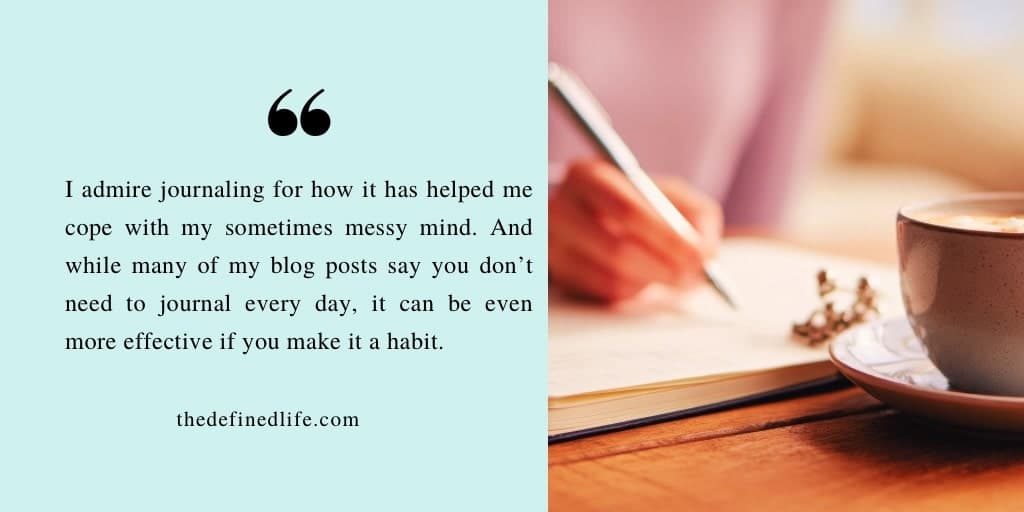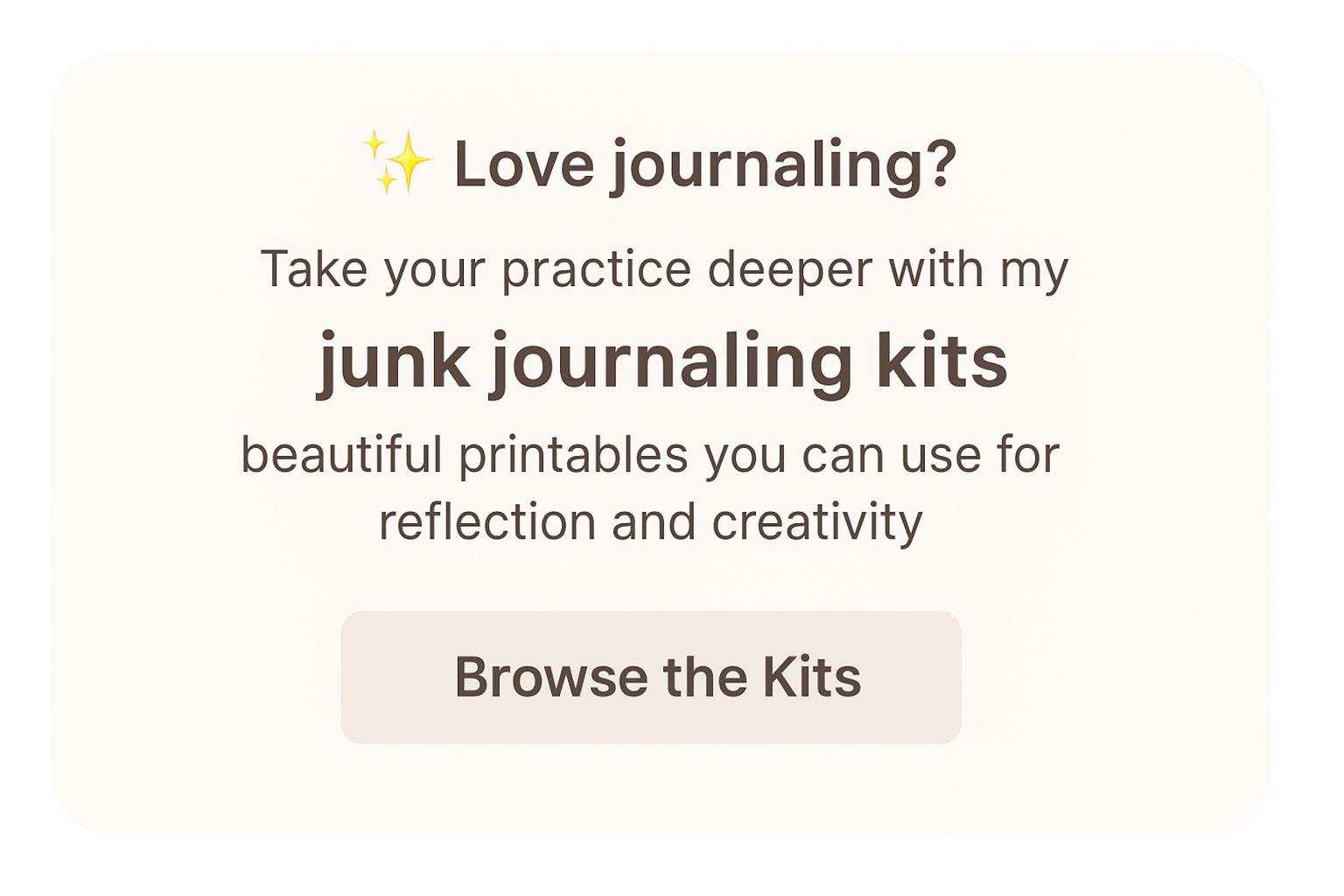
I admire journaling for how it has helped me cope with my sometimes messy mind. And while many of my blog posts say you don’t need to journal every day, it can be even more effective if you make it a habit.
We are living in a fast-paced environment, and journaling can be a way to slow down, acknowledge how you feel, and celebrate every win.
In this post, I’ll share how to start everyday journaling, why it’s so powerful, and easy prompts you can use to make it a habit that sticks.
Table of Contents
What is Everyday Journaling?
To put it simply, everyday journaling is the practice of writing a little bit each day—whether that’s a few sentences, a short list, or even just one line. Unlike keeping a diary, which mostly records events, everyday journaling goes deeper. It’s about reflection, creativity, and being intentional with your thoughts.
Think of it this way:
Diary: What happened today.
Everyday journaling: How today felt, what you noticed, and what you want to remember.

Why Try Everyday Journaling?
The beauty of everyday journaling is that it doesn’t take much time but offers lasting benefits. Here are a few:
Clear your mind. Writing helps you process your thoughts instead of carrying them around. Putting them on paper is a free and safe way to unload those bothersome thoughts. Although journaling does not solve our problems, putting them into words can help us see the bigger picture and possible solutions.
Practice mindfulness. You notice details you might otherwise overlook. Awareness is an important aspect of self-improvement. You cannot solve a problem if you don’t know what it is.
Boost creativity. A few lines a day can spark ideas and self-expression. Journaling is undeniably beneficial for creatives. Jotting down ideas and inspiration can keep creativity flowing.
Also, try these Art Journal Ideas for Self-Discovery and Everyday Expression
Build a keepsake. Your journal becomes a record of your growth, challenges, and little wins.
It’s like giving yourself a daily mental reset—a time to slow down and appreciate your resilience.
How to Start Everyday Journaling (Step by Step)
1. Choose your journal.
This part is personal. Some people love the feel of a classic notebook, others like a bullet journal with dotted pages, and some prefer a digital app they can carry on their phone. There’s no wrong choice—pick the one that makes you want to open it every day.
2. Set a time.
Journaling works best when it becomes part of your routine. Try mornings if you like setting intentions and planning your day, or evenings if reflection feels more natural. You don’t need a strict schedule—just a pocket of time you can return to most days.
3. Keep it short.
You don’t have to fill pages to call it journaling. Even writing 3–5 honest sentences is enough to build momentum. Think of it as a check-in with yourself, not an essay. What matters most is showing up consistently.
4. Use prompts.
Blank pages can feel intimidating, so prompts are like little sparks to get you going. They might ask you about your goals, feelings, or even the best part of your day. Having a list of prompts nearby makes it easier to dive in without overthinking.
5. Make it yours.
Journaling doesn’t have to be just words. Add doodles, tape in a receipt or photo, use washi tape, or jot down a quick list. The more personal and fun your journal feels, the more likely you’ll stick with it.
Everyday Journaling Prompts for Beginners
Not sure what to write? Here are some simple prompts to get you started:
1. What’s one thing I’m grateful for today?
Gratitude shifts your focus toward the good in your life. Even noting something small—like a warm cup of coffee—can lift your mood.
Check out 7 Uplifting Morning Journal Prompts
2. What was the highlight of my day?
This helps you notice and remember the best parts of your day instead of letting them slip by unnoticed.
3. What do I want to let go of right now?
Writing down worries, stress, or negative thoughts gives you a sense of release, almost like setting them aside on paper.

4. What’s one small win I had today?
Recognizing little victories builds confidence and motivation. Small steps really do add up over time.
5. What’s a thought or feeling I want to remember?
This keeps you connected to your emotions and allows you to capture meaningful moments you might forget later.
These prompts keep journaling light but meaningful—perfect for beginners or anyone who wants a simple daily practice.
Everyday Journaling Example
Here’s how a short entry might look:
> Today felt busy but satisfying. I’m grateful for my morning walk and the quiet moment it gave me. My small win was finishing a task I’d been avoiding. Right now, I feel calm and proud of myself for showing up.
It’s short but enough to capture the essence of the day.
Tips to Make Everyday Journaling a Habit

Starting a journal is exciting—but keeping the habit going is where the real transformation happens. Here are some simple, practical ways to make journaling part of your daily rhythm:
1. Pair it with a routine.
Habits stick more easily when you anchor them to something you already do. Try writing while sipping your morning coffee, after your nightly skincare, or even right before you turn off the lights. The familiar cue makes it harder to forget.
2. Keep it visible.
Out of sight often means out of mind. Leave your journal on your nightstand, by your desk, or wherever you naturally pause during the day. Seeing it reminds you of your intention and makes journaling effortless to begin.
3. Start tiny.
You don’t need to fill pages to count it as journaling. Even one sentence about how you feel, one thing you’re grateful for, or one thought you want to remember is enough. Small wins build momentum and turn into bigger habits over time.

4. Reward yourself.
Acknowledge your effort—because it matters! Use checkmarks on your calendar, a favorite sticker, or even a whispered “Yes, I showed up today.” Celebrating consistency (not perfection) keeps journaling joyful rather than a chore.
Remember: Your journal is not a test—it’s a safe place to grow. Progress matters far more than perfection.
Final Thoughts on Everyday Journaling
Everyday journaling is one of the simplest but most rewarding habits you can start. With just a few minutes a day, you’ll create a practice that clears your mind, helps you reflect, and gives you a collection of moments to look back on.
If you’re ready to dive in, grab your favorite notebook—or explore my printable journaling kits, designed with prompts and creative pages to make your everyday journaling more inspiring.
Happy journaling.








Leave a Reply